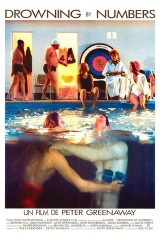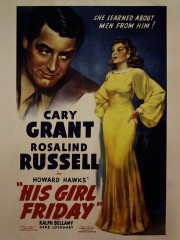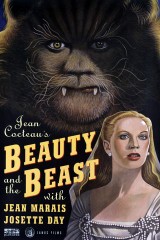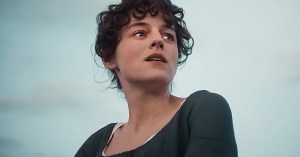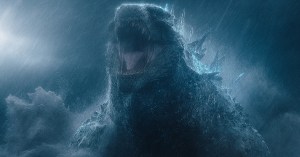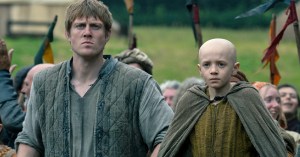Neil Gaiman’s Five Favorite Films
The Sandman graphic novel series writer and author of Good Omens – now a streaming series – chooses classics, including If…, His Girl Friday, and All That Jazz.

(Photo by )
Beloved novelist Neil Gaiman — Coraline, American Gods, Stardust, and The Sandman graphic novel series — took charge of the book-to-screen adaptation of the 1990 novel Good Omens: The Nice and Accurate Prophecies of Agnes Nutter, Witch to fulfill a promise to his good friend and collaborator Terry Prachett, who died in 2015. Now that the series Good Omens has arrived as an Amazon Prime offering, we caught up with Gaiman to talk about the new comedic fantasy series and his favorite films.
The limited series boasts a stellar lineup of acting talent, including Michael Sheen (Frost/Nixon) as angel Aziraphale, who botches his gig as Garden of Eden chief of security by allowing demon Crowley, played by David Tennant (Doctor Who), to tempt Eve with an apple from the tree of the knowledge of good and evil. In the subsequent millennia, the two find themselves repeatedly at odds, and form a friendship of a sort that only two mutually admiring adversaries can. Their bond transcends the modern bromance and is more celestial in nature, with Crowley regularly tempting Aziraphale into small transgressions on his path, and Aziraphale occasionally coaxing out Crowley’s better angel. Their friendship meets the ultimate test when the Antichrist arrives and is promptly misplaced. The duo must work together to stop End Times lest humanity, good wine, and fine cuisine perish in the Apocalypse.
Mad Men’s Jon Hamm is a brash, Americanized Archangel Gabriel, who is captain of Team Heaven, while Anna Maxwell Martin (The Bletchley Circle) appears as Beelzebub, leader of the forces of Hell. Josie Lawrence (Enchanted April) appears as 17th century witch Agnes Nutter, who produces the only accurate book of prophecies ever written. Adria Arjona (True Detective) is Anathema Device, a witch and Agnes Nutter’s descendant, while Miranda Richardson appears as part-time medium and prostitute Madame Tracy, who cares for her righteous neighbor, Witchfinder Sergeant Shadwell played by Michael McKean. Frances McDormand is the voice of God, Benedict Cumberbatch voices Satan, and Sam Taylor Buck is reluctant Antichrist Adam Young.
The series, a coproduction of Amazon Studios and BBC Studios, is directed by Douglas Mackinnon (Doctor Who) and also features Jack Whitehall, Mireille Enos, Brian Cox, Nick Offerman, Ned Dennehy, Ariyon Bakare, Nina Sosanya, Steve Pemberton, and Mark Gatiss.
Gaiman, whose Starz adaptation of American Gods was recently renewed for a third season, shared his five favorite films and another fantasy he’s working on: retirement.
Debbie Day for Rotten Tomatoes: We’re doing a feature called “Five Favorite Films.” Were you able to give that any thought?
Neil Gaiman: You know I really wish somebody had said, “They are doing a feature called ‘Five Favorite Films,’ please have five films ready.” Then I could have just had it for you, rather than what I’m going to have to do now which is grab a piece of paper and a pencil and scribble. Just give me a few seconds, I’m just going the scribble. The nice thing about lists of favorite films is … they always change. Let’s see, there’s four and … OK, there we are, there’s five favorite films jotted down. Don’t know that they’d be the same five favorite films that I would come up with …Tuesday next. But, they’re a good start.
Speaking of heart attacks and artists, how’s TV development treating you? I mean you seem extraordinarily busy.
Gaiman: I am, although, you know, a week from now on the 31st of May, Good Omens comes out and happens, and I get to retire as a showrunner. I guess I might have to come out of retirement if we get nominated for awards — just turn up at award dinners and things. But basically as far as I’m concerned I made this thing that I promised Terry Pratchett I would make and now I’m done. I don’t have to be a showrunner anymore. I love talking all the things that I’ve learned in the four years I’ve been making Good Omens and getting to apply them to other things and getting to help other people make things.
So you know, it’s nice to be a producer of Gormenghast, for example, and I’m very actually looking forward to seeing and helping Toby Whithouse along and looking forward to Toby going out to the world with his Gormenghast. I’m looking forward to being more involved in adaptations of my own stuff coming up in the future, but I don’t really want to write them again, I don’t want to showrun again. I would really like to become a writer, and possibly even a novelist again.
I hear you have some talent for that.
Gaiman: As I’ve said, I will become a retired showrunner, and in my retirement, I may take up writing.

(Photo by Amazon Prime)
Good Omens looks like it was a blast to film. What was that experience like?
Gaiman: It was a blast to film. Good Omens was fascinating because it was an incredibly long shoot. We were making Good Omens, I think we shot altogether for about 120 days, and it’s a lot like making a 6-hour-long movie. And when we finished, it was then followed by 11 months of post-production, so that was long, long days, hard work, making something huge, but also — more by luck than anything else, because it just came down to me and director Douglas MacKinnon so much of the time — we wound up making something that feels very, very handmade and feels pretty personal. We got to make personal choices, and there wasn’t anybody leaning over our shoulders saying, “No you need this. You can’t do that.”
Is that one of the joys of working with a streaming company?
Gaiman: I think Amazon trusted us, which was great, and the BBC who were technically our producers, nobody had ever done anything like this before, and they didn’t really know what it was, and they just left us alone to get on with it.
Well, you can’t argue with the result – it’s a joy to watch your work come to life with such talented actors.
Neil Gaiman: Thank you. I’m so proud of it. I made the show for Terry Pratchett, he asked me to make it before he died, and then he died. I wanted to make a show that Terry would have loved, and make a show that Terry would have laughed at, but also that contained all of the ideas and the textures of Good Omens, and I think we did it.
May I ask, what is going on with The Sandman? That’s one I’ve been really looking forward to.
Gaiman: Sandman has been interesting, because for the last 30 years … people have failed to make all sorts of versions of Sandman because the time was not right. In the ’90s people were going, “We don’t know how to make a $70 million R-rated film that would have any CGI in it … that doesn’t work for us,” and all of this kind of stuff. What’s great about now is we’ve reached an era in which the fact that there are well over 80 Sandman stories becomes a feature, it becomes an advantage, rather than a problem with how you cram all that into 120 minutes.
So, we now have the CGI, we now have the technology, and we now have an adult audience, and we have millions upon millions of people who love Sandman and would love to see it. So I would be very, very surprised if we do not actually get some cool Sandman thing happening in the next two or three years. But then again, there have been many things over the years with Sandman where I’ve gone, “Ah, OK. Well, they’re going to make this. And this is going to be great then.” And it has never happened. So anything is possible.
Good Omens debuts on Friday, May 31 on Amazon Prime.






